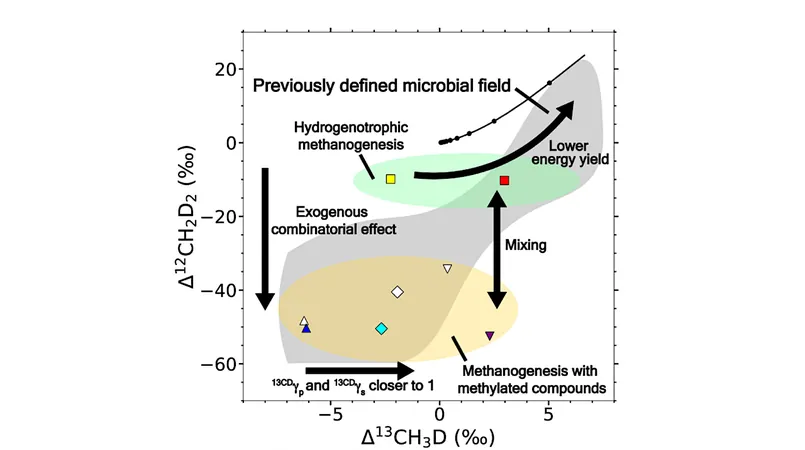
Unlocking the Secrets of Infant Health: The Power of the Microbiome
2025-06-27
Author: Emma
The Hidden Key to Infant Wellness
Imagine a world where we not only celebrate a balanced diet and regular check-ups for infants but also recognize the immense influence of an unseen world—the microbiome. Researchers at the University of South Florida’s Microbiomes Institute are shedding light on how this microscopic ecosystem plays a vital role in early health.
What is the Microbiome?
The microbiome comprises trillions of bacteria, viruses, and fungi primarily thriving in the gastrointestinal tract but also flourishing on the skin and within the mouth and other areas of the body. These minuscule organisms are essential allies in digesting food, producing vitamins, defending against harmful pathogens, and educating the immune system. At birth, an infant's microbiome is a blank canvas, influenced by the method of delivery, environmental factors, antibiotic exposure, and feeding type.
The Crucial First Year of Life
The first year of existence is not just about physical growth for infants; it’s also a period of tremendous microbiome development with repercussions for lifelong health. Newborns inherit bacteria from their mothers and surroundings during birth. Vaginal births introduce beneficial bacteria like Lactobacillus and Bifidobacterium, while cesarean sections may expose infants to skin bacteria. As infants mature, their microbiomes rapidly diversify and resemble adult profiles by ages three to four. However, the foundational microbiome established in infancy can influence future health issues, including allergies, asthma, and obesity.
Breastfeeding: Nature’s Superfood
Breastfeeding for the first six months is heralded as the gold standard for infant nutrition. Beyond nourishment, it intricately shapes the microbiome and immune system. One fascinating component of breast milk, human milk oligosaccharides (HMOs), serves as a feast for beneficial bacteria like Bifidobacterium, promoting their growth. Research indicates that breastfed infants develop healthier gut microbiomes, which are associated with better digestion and immunity. In contrast, formula-fed infants might host a more diverse but less beneficial microbial community.
Unique Challenges for Preterm Infants
Preterm babies, born before 37 weeks, face distinct microbiome challenges. Often separated from their mothers in NICUs, subjected to antibiotics, and possibly deprived of breast milk, their gut microbiomes follow a different developmental path. This dysbiosis increases the risk of infections and conditions like necrotizing enterocolitis (NEC), a severe gastrointestinal disease. Doctors are investigating strategies to enhance the microbiome of these vulnerable infants, focusing on breast milk and judicious antibiotic use.
The Long-Term Impact of the Microbiome
A well-balanced microbiome is crucial for teaching the immune system to distinguish between harmful and harmless microbes. Studies show that healthier microbiomes in breastfed infants correlate with lower risks of respiratory infections, allergies, obesity, and even type 2 diabetes. The importance of establishing a resilient microbiome during infancy cannot be overstated.
Bridging Knowledge Gaps
While progress has been made, researchers like Drs. Pace and Ho are addressing pivotal questions regarding the microbiome's role in long-term health. They seek answers about the essential bacteria for health, the ideal components of breast milk, and strategies to restore a healthy microbiome post-antibiotics.
The Future of Microbiome Research
The USF Microbiomes Institute is at the forefront of microbiome research, exploring innovative probiotics derived from human bacteria and the influence of maternal microbiomes during pregnancy and lactation. Future medical practices may tailor interventions based on individual microbiomes to enhance infant health.
As we uncover more about this intriguing frontier, one fact remains crystal clear: nurturing the microbiome in early life through breastfeeding and attentive care can lead to remarkable short-term and long-term health benefits.









 Brasil (PT)
Brasil (PT)
 Canada (EN)
Canada (EN)
 Chile (ES)
Chile (ES)
 Česko (CS)
Česko (CS)
 대한민국 (KO)
대한민국 (KO)
 España (ES)
España (ES)
 France (FR)
France (FR)
 Hong Kong (EN)
Hong Kong (EN)
 Italia (IT)
Italia (IT)
 日本 (JA)
日本 (JA)
 Magyarország (HU)
Magyarország (HU)
 Norge (NO)
Norge (NO)
 Polska (PL)
Polska (PL)
 Schweiz (DE)
Schweiz (DE)
 Singapore (EN)
Singapore (EN)
 Sverige (SV)
Sverige (SV)
 Suomi (FI)
Suomi (FI)
 Türkiye (TR)
Türkiye (TR)
 الإمارات العربية المتحدة (AR)
الإمارات العربية المتحدة (AR)